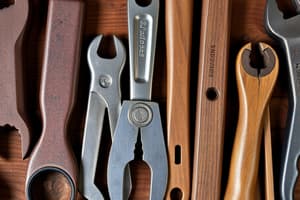Podcast
Questions and Answers
What is the primary function of a bench vise?
What is the primary function of a bench vise?
- To hold circular work for machining
- To drill or tap small workpieces
- To hold work securely on a workbench (correct)
- To clamp parts together
Which tool is specifically designed for holding small machining operations?
Which tool is specifically designed for holding small machining operations?
- C-clamp
- Bench vise
- Toolmakers' handvise (correct)
- V-blocks
What does a V-block primarily assist with during machining?
What does a V-block primarily assist with during machining?
- Holding circular work pieces in position (correct)
- Adjusting pressure on workpieces
- Clamping parts together on machines
- Handling small parts at the workbench
How is the size of a C-clamp determined?
How is the size of a C-clamp determined?
Which tool consists of two flat jaws adjusted by a screw mechanism?
Which tool consists of two flat jaws adjusted by a screw mechanism?
What characterizes a vise grip?
What characterizes a vise grip?
What type of tool is a saw classified as?
What type of tool is a saw classified as?
Which of the following describes bench work?
Which of the following describes bench work?
What is the main function of a coping saw?
What is the main function of a coping saw?
Which type of hammer is primarily used for forging metal?
Which type of hammer is primarily used for forging metal?
What distinguishes a rip saw from a crosscut saw?
What distinguishes a rip saw from a crosscut saw?
What is a common use for tin snips?
What is a common use for tin snips?
Which of the following tools is primarily used to extract nails?
Which of the following tools is primarily used to extract nails?
What is the purpose of the blunt end of a chisel?
What is the purpose of the blunt end of a chisel?
Which type of hammer has a flat face and a round peen?
Which type of hammer has a flat face and a round peen?
What type of cut is a crosscut saw designed to make?
What type of cut is a crosscut saw designed to make?
What are the types of chisels mentioned?
What are the types of chisels mentioned?
What is the primary function of a file?
What is the primary function of a file?
Which type of file is designed for achieving a smooth surface on harder metals?
Which type of file is designed for achieving a smooth surface on harder metals?
What is one of the key care tips for preserving the life of a file?
What is one of the key care tips for preserving the life of a file?
What does the term 'bastard' refer to when discussing the degree of coarseness of files?
What does the term 'bastard' refer to when discussing the degree of coarseness of files?
Which of the following is NOT a common type of file used in machine shop work?
Which of the following is NOT a common type of file used in machine shop work?
What characteristic distinguishes double-cut files from single-cut files?
What characteristic distinguishes double-cut files from single-cut files?
Which tool is primarily used for shaping and finishing hard metals in a machine shop?
Which tool is primarily used for shaping and finishing hard metals in a machine shop?
What is the primary purpose of Vee blocks?
What is the primary purpose of Vee blocks?
Which of the following is NOT a component of a combination square set?
Which of the following is NOT a component of a combination square set?
How accurate is the protractor head of the combination square set in measuring angles?
How accurate is the protractor head of the combination square set in measuring angles?
What feature of the combination square blade helps prevent dirt buildup?
What feature of the combination square blade helps prevent dirt buildup?
Which angle can the square head of the combination square be used to construct?
Which angle can the square head of the combination square be used to construct?
What is measured by the center head when used on the combination square blade?
What is measured by the center head when used on the combination square blade?
What is the function of the graduated rule in a combination square set?
What is the function of the graduated rule in a combination square set?
What materials are commonly used to manufacture Vee blocks?
What materials are commonly used to manufacture Vee blocks?
What is a primary function of a ruler?
What is a primary function of a ruler?
Which type of ruler is specifically useful for measuring in small openings?
Which type of ruler is specifically useful for measuring in small openings?
What unique feature does a hook rule have?
What unique feature does a hook rule have?
What is the purpose of a flex steel rule?
What is the purpose of a flex steel rule?
Which ruler type is designed to measure depth?
Which ruler type is designed to measure depth?
How is a tape rule commonly used?
How is a tape rule commonly used?
What is a short length rule holder primarily designed for?
What is a short length rule holder primarily designed for?
What distinguishes calipers from other measuring tools?
What distinguishes calipers from other measuring tools?
Flashcards are hidden until you start studying
Study Notes
Hand Tools and Bench Work
- Hand tools are tools held in the hand and operated without electricity or other power.
- Bench work refers to work done at a workbench, worktable, etc.
Work Holding Tools/Devices
-
Bench Vise - A swivel based bench vise is commonly used for general work. It is fastened to the bench with bolts and has serrated, hardened jaws for a firm grip on work.
-
V-Blocks - Used to hold circular work for laying out or setting up for machining. Some are fitted with clamps for a secure hold.
-
Toolmakers’ Handvise - A small steel vise with interchangeable blocks used for holding work during operations like drilling and tapping.
-
C-Clamp - A versatile clamp used to hold workpieces on drill presses and clamp parts together.
-
Toolmakers’ Parallel Clamp - Consists of two flat steel jaws which can be adjusted by means of a screw passing through the center of each jaw. Used for holding small parts at the bench and machines.
-
Vise Grip - A latching mechanism with a high degree of mechanical advantage, making it very strong when locked down.
Work Cutting Tools/Devices
-
Saw - Consists of a tough blade with a toothed edge used for cutting materials, often wood. The cut is made by placing the toothed edge against the material and moving it forcefully.
-
Hand Saw - Used for cutting pieces of wood into different shapes.
- Crosscut Saw - Cuts wood perpendicular (across) to the grain.
- Rip Saw - Cuts wood parallel to the grain.
-
Coping Saw - Used for cutting intricate external shapes and interior cut-outs in woodworking or carpentry.
-
Hacksaw - A hand tool with a fine-toothed blade tensioned in a C-frame, commonly used for cutting metals and plastics.
-
Tin Snip - Used for cutting thin sheets of metal, plastic, fiber, etc.
Work Striking Tools/Devices
-
Hammer - A tool that delivers a blow to an object, used for driving nails, forging metal, and breaking apart objects. There are various types including:
- Ball-peen Hammer - Used for general work (flat face) and peening and riveting (round end)
- Straight Peen Hammer - Used for stretching and drawing out metal when forging.
- Cross Peen Hammer - Used for stretching and drawing out metal when forging.
- Claw Hammer - Used for extracting nails.
-
Mallet - A smaller type of hammer often made of rubber or wood, with a relatively large head.
-
Chisel - A tool made of hexagon or octagon shaped tool steel. One end is shaped for cutting, the other end receives blows from a hammer. Chisel types include Flat Cold Chisel, Cape Chisel, Round Nose Chisel, and Diamond Point Chisel.
Work File Tools/Devices
-
File - A hand-cutting tool with many teeth used to remove burrs, sharp edges, and surplus metal, producing finished surfaces. They are made of high-carbon steel.
- Tang: The handle attachment point.
- Length: The overall length of the file.
- Tip: The pointed end.
- Edge: The cutting edge.
- Heel: The wide end.
- Face: The flat surface of the file.
-
Classes of Files
- Single-Cut Files: Have a single row of parallel teeth, used for smooth surfaces and harder metals.
- Double-Cut Files: Have two rows of teeth crossing each other, removing metal quickly and making for easy clearing of chips.
-
Degree of Coarseness - Files are produced in various degrees of coarseness, indicated by terms like rough, coarse, bastard, second-cut, smooth, dead smooth, or numbers from 00 to 8 (00 being the coarsest).
-
Shapes of Files - Files are identified by their cross-section, shape, and special use. Common types include Mill, Flat, Hand, Pillar, Square, Round, Three-Square (triangular), Half-Round, Crocket, Crossing, Waring, Barrette, and Knife.
-
Care of Files
- Always use a file with a handle.
- Do not knock a file on a vise or hard surface to clean it.
- Keep a firm grip on the file at all times.
- Never use a file as a pry or hammer.
- Store files separately to preserve their edges.
-
Filing Techniques - Different files and techniques are used depending on the task at hand.
Measuring Instruments
-
Measurement - The act or process of determining dimension, capacity, or amount.
-
Ruler (rule or line gauge) - An instrument used to measure distances or rule straight lines.
-
Types of Rulers:
- Steel Rule - Graduated in inches/fractions and centimeters/millimeters.
- Narrow Rule - Made of tempered steel used for measuring in small openings and spaces.
- Hook Rule - Has a hook for measuring from an inside edge.
- Flexible Steel Rule - Made of tempered spring steel, used for general use or measuring curved work.
- Short Length Rule Holder - Used for taking measurements in small openings, with interchangeable blades.
- Tape Rule - A metallic tape used for measuring bar stock and long materials.
- Rule Depth Gage - Designed to measure the depth of holes and slots.
-
Caliper (transferring tools) - Tools used to measure a work piece by contact rather than by scale reading.
- Caliper measurements are set by a steel rule and then used to check a work piece.
- The method can also be reversed, with the contact tool set by the work piece and then checked on a steel rule.
Studying That Suits You
Use AI to generate personalized quizzes and flashcards to suit your learning preferences.




